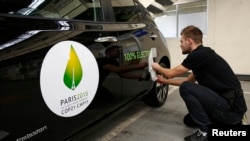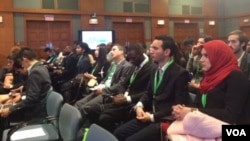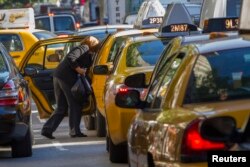Hundreds of young people from around the world gathered Monday at the World Bank in Washington to focus on their role in the fight against climate change, as world leaders prepare to meet in France later this month for the COP21 U.N. conference of the Parties – the annual meeting of all countries that want to take action for the climate.
World Bank Group Vice President and special Envoy for Climate Change Rachel Kyte told the crowd of young people their actions do make a difference.
“One of us, two of us, five of us and 10 of us all deciding to demand different actions at the state, local, city, country level makes a difference," she said. "The purchasing decisions we make in terms of food and electricity make a difference. This might seem like a global existential treat but it’s actually about the footprint we all put on the planet and the way in which our governments represent the way young people think about it.”
Kyte says while most survey data show that people understand the world has to reduce the amounts of carbon pollution in the atmosphere in order to be able to have better oceans, fields, food and safe water, there still are a few skeptics.
“In America for all kinds of reasons it’s become a partisan issue and there’s a lot of misinformation out there,” she said, but “the farmers of California, Colorado, the Dakotas; the people of the Great Lakes, Staten Island, Florida, North Carolina, Maine, Galveston, Texas all understand the natural disasters and the weather patterns they are seeing shift are coming from something which isn’t just sporadic and that’s focusing people’s attention more on the issue.”
Kyte said one can’t change everybody’s mind, but that with a working majority change will happen, and young people are the key.
Participant Raddhima Yadav is an undergraduate student at Yale University. She has been involved with the U.N. climate talks as a youth delegate in the past five years. She said the key issue that many political leaders seem to miss is that climate change is interconnected to every other issue in a political agenda.
She also said the narrative needs to be shaped not as climate change being some catastrophe or an apocalyptic scenario, which can put people off. She argued it would be better to make it more relatable to people’s daily lives, making it about gender, education, employment, water, issues that affect people’s daily lives.
Derrick Opio Hosea, another participant, is the founder of one lamp express and is from Uganda. He said 85 percent of people in his country use kerosene lamps because they don’t have access to the grid, but about 80 percent of the same people have access to mobile phones. His company enables everyone with a mobile phone to order a solar lamp and get it delivered to their doorstep. They’ve managed to sell 4,000 solar lights and have reached more than 12,000 homes and reduced the amount of carbon emissions from kerosene lamps.
Youth Summit Chair Ines Gonzalez Del Mazo said the two-day event will include a competition. They receive 330 proposals from more than 70 countries. Six finalists will pitch their ideas, which she hopes can be turned into businesses or shape policies. The winners will be sent to New York’s International Council of Small Businesses Annual Academy for training and mentorship.
Three of the six finalists
Team Helios led by Michael Eschmann has four members from Seattle, Canada, Austria and Switzerland. The group of friends who went to grad school in the U.S. teamed up to help farmers in India get away from diesel powered irrigation pumps that contribute to carbon emissions and high diesel fuels costs. Instead, the team proposes to allow farmers to rent solar irrigations systems and receive incentives for efficient water use.
Sebastian Rodriguez is from Mexico and is the leader of Team Kopagas, which includes a Tanzanian and a Chinese national living in Tanzania. The group will present a pay-as-you-go model using electric canisters to accelerate the use of liquefied petroleum gas rather than charcoal and wood. Rodriguez said cooking with charcoal is equivalent to smoking 100 cigarettes per hour, therefore creating serious health issues. He said the team has a blueprint for a leasable canister that can monitor the amount of gas remaining and only charge customers for what is used. They’ve recently secured a $250,000 grant and hope that winning this competition will push their project forward.
Ginny Wang is from China. Her team of four includes her friends from Taiwan, Britain and China. They are working on a project called Team Greenie Exchange as a way to give incentives to people. They hope to participate in the reduction of the carbon footprint by earning positive rewards. She said most of the time we hear about what governments can’t do, but she wants to encourage people to do what is right and take simple steps by riding a bicycle, for example, instead of driving. That can reduce one’s carbon footprint.
Users can take actions such as join a carbon reduction program, carpool or recycle to earn “green coins” which are credited to a user’s electronic wallet and can be spent at partnering businesses.















